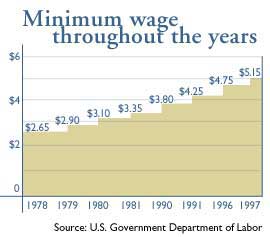|
Congress set to hike wage
|
 |
January 24, 2000: 10:58 a.m. ET
Small-business groups expect early vote on bill to boost wage to $6.15 by 2002
By Staff Writer Hope Hamashige
|
NEW YORK (CNNfn) - Congress reconvenes Monday, and small-business groups, much to their dislike, are bracing for something they now consider inevitable: a vote in the House of Representatives to increase the minimum wage.
"We have a lot of concerns about the effect this is going to have on small-business owners," Nelson Litterft, a spokesman for the National Federation of Independent Business, said.
Despite continuous lobbying and vocal opposition by small-business owners and advocates, the "if it polls well, it will pass" principle is expected to push a minimum wage hike quickly through the House of Representatives. While grossly unpopular with small-business owners, the bill is supported by the general public and even a large number of moderate Republicans, and therefore is expected to pass early in this session of Congress.
The main question remaining is the form the new wage hike will take and what offsets Congress will give employers for the hit they will take from higher wages. Smart money seems to be on legislation introduced in October by Rep. Rick Lazio (R-N.Y.) that has heavy bipartisan support.
The front runner
Lazio's bill would raise the minimum wage by $1, to $6.15, over the next three years. The first increment would take the minimum wage to $5.48 by April 1, 2000.
April 1, 2001, would see a second increase of 33 cents and a final increase of 34 cents would be put in place April 1, 2002.

It also contains a number of tax breaks and regulatory relief for businesses, aimed primarily at easing the pain small business owners will feel from an increase in the cost of labor.
Although small-business owners and advocates oppose Lazio's bill on the basis that they will never support a minimum wage increase, most reluctantly admit it is likely to pass and is not as Draconian as some of the wage bills that had been discussed.
David D'Onofrio, spokesman for National Small Business United, described the Lazio bill as "the best of all of the bad options." Rep. David Bonior (D-Mich.), for example, has introduced a more severe bill that would raise the minimum wage to $6.15 over two years and contains no offsets in terms of tax relief.
Tax breaks offset costs
While NSBU is fundamentally opposed to increase in the minimum wage. D'Onofrio said the Lazio bill is the most palatable of the minimum wage proposals because it contains many tax breaks and regulatory relief that businesses have lobbied for.
The bill reduces estate tax rates to make it easier for small-business owners to pass their businesses to their heirs. It also accelerates the 100 percent health-insurance deduction for self-employed people. And it increases the contribution limits on pension plans, allowing workers over age 50 to save additional funds for retirement. The relief provisions of the bill created a total of $35 billion savings for business owners over five years.
Despite the positive effects small businesses will reap from the tax relief, small business groups oppose wage hikes on principle. Government-mandated minimums are simply bad for business, they say. At best, Litterft explained, increasing the cost of doing business could stunt the growth of small business. At worst, it could mean layoffs at those small businesses that are struggling to get by.
'Morphine for the pain'
The tax breaks, according to statements made by Lazio, amount to $35 billion in combined savings for business owners over the next five years. That amount is more than twice the combined cost of the wage increases.
D'Onofrio described the tax breaks as the "morphine that takes away the pain" of the minimum wage increase. Still, D'Onofrio said Congress could have gone further to protect the interests of small businesses by reducing the estate tax all the way to zero. They also should consider making health insurance 100 percent deductible by 2000 rather than by 2001, he said.
No official date has yet been set for the floor debate on the minimum wage proposals. According to sources, it is likely to come up early in February and probably will be voted on later in the month. 
|
|
|
|
|
 |

|

